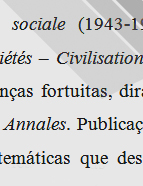

................................
His medievalist teacher will have read a good deal of the works he praises: "the work he left, although not overly extensive, opens new perspectives for History in a manner akin to a flash, replacing the old concept of the science of the past with that of the science of man or rather, of men - of men in time - a science which does not break man down into separate functions, but which places him entirely within himself. This is why history evolves with man, and like him it is ingenious, it is active." (Soares, Marc, p. 6). He even says of this "apostle of noble ideals" that he was headed for martyrdom. And he highlights how his action in the journal was central: "In order to apprehend Marc Bloch's work, reading his books does not suffice. In fact, it is fair to say that none retains as much of the flavour of his mental activity as the Annales d'Histoire économique et sociale, founded in 1929 with Lucien Febvre." (Idem, p. 7). And although rapidly, Torquato attentively revises his books and articles, and also some of his texts in the journal in question, all laden with praise. He also announces the preparation of a "thorough critical examination" of Apologie pour l'Histoire ou Métier d'Historien, which he claims to be "rich in ideas and suggestions" (Idem, p. 24). It is strange that he does not separate the historian from the citizen, being an opponent of Nazism, generated with the communists, which Torquato vehemently criticized in his classes, at least in the sixties. All because it is a "message of such a rich personality, such a fine spirit, one that is well-seasoned with reflection and experience, the latter sometimes so cruel, no one is left indifferent" (Idem, pp. 24-25).
But with the honourable exception of the heartfelt evocation of Marc Bloch, Torquato would not go beyond the somewhat erudite historians, such as Gama Barros, in his works, or advance much further in modernity, which he despised despite the attention he paid to titles published in France and Spain, having acquired a good and updated bibliography for the Faculty. Insurmountable contradictions. It was through him that Charles Verlinden (1946-1947) and Yves Renouard (1949-1950) spent time in Coimbra, however they left no mark or followers, nor did it matter to anyone. The late 1940s, 1950s and early 1960s were dark years for the Faculty. The furthest Torquato would go as a historian ( and only sometimes) was as far as Henri Pirenne and François-Louis Ganshof, with the occasional incursion in the general work of Michel Mollat (Soares, “O Infante” [The Infante]).
